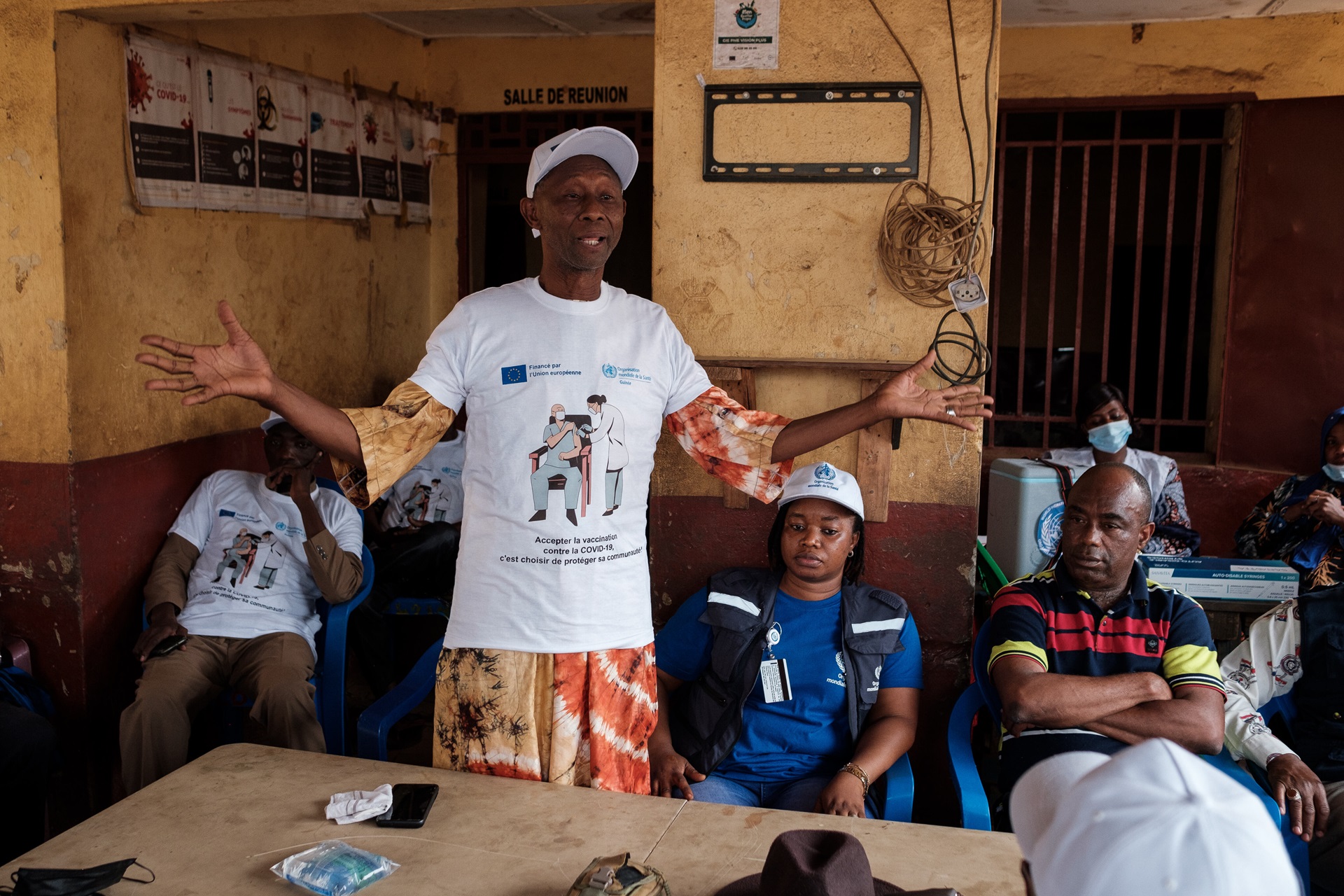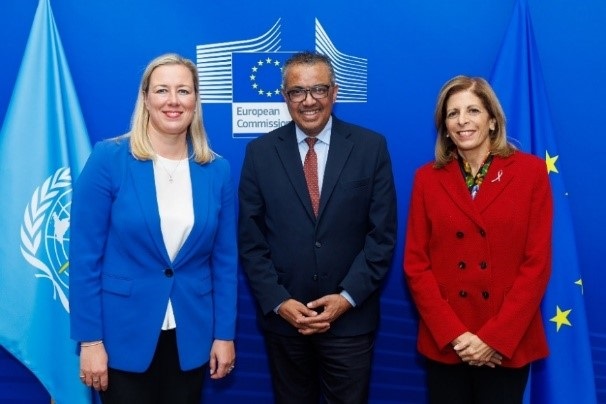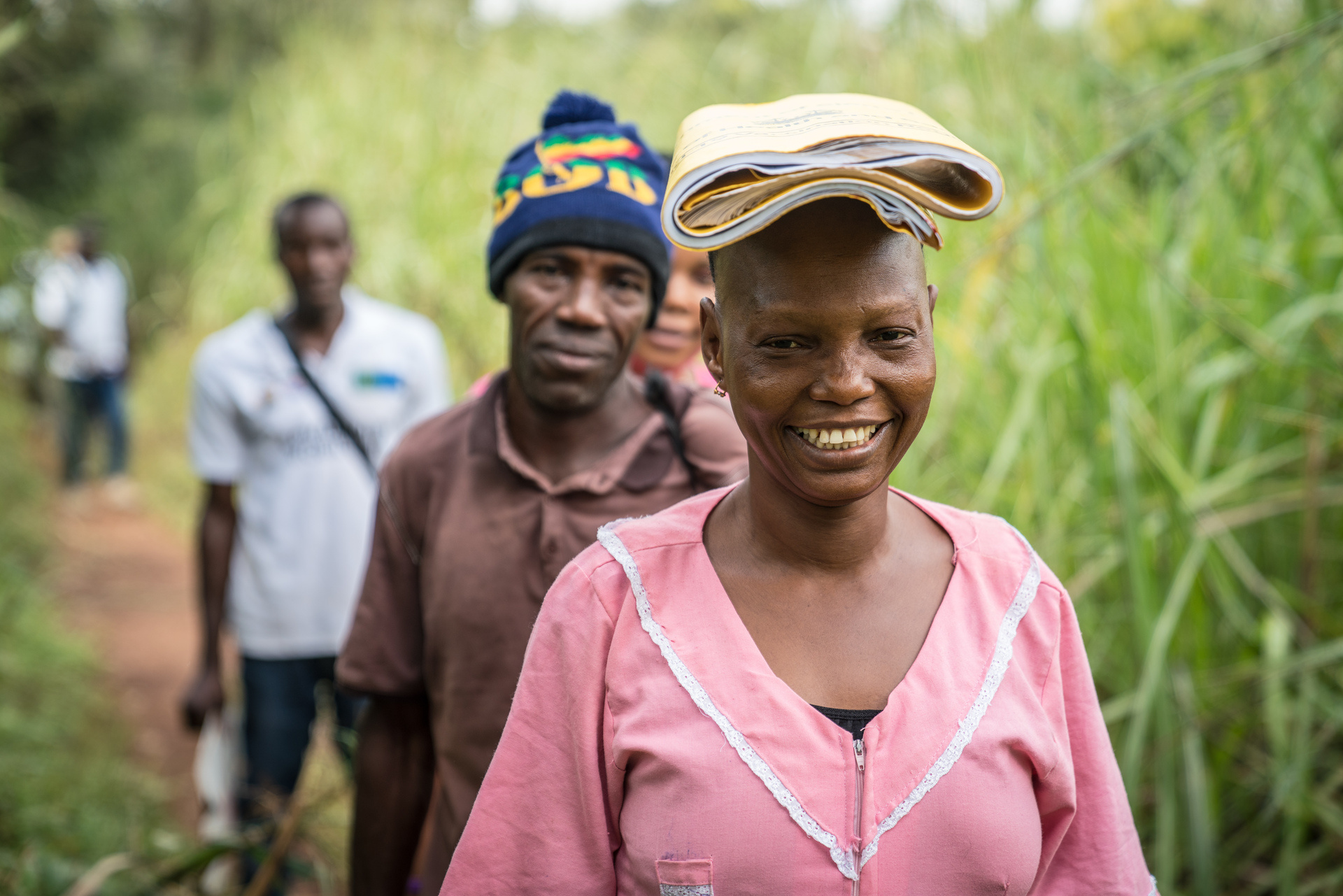
The European Union
Partner in global health
A strategic partnership with the EU for better health for all
The European Union (EU) plays a leading role in global health, shaping priorities through international fora, such as the G20 and G7. The EU provides critical financial support to health and related issues, including human development, climate change, crisis management and humanitarian assistance.
The EU's leading role in fighting the COVID-19 pandemic was an example of its contribution to global health goals with the Team Europe approach (Team Europe is an initiative launched by the European Commission to combine the resources from the EU institutions, the EU Member States, and the European Investment Bank to support countries in the fight against the pandemic).
The EU - WHO partnership is long-lasting and strategic, supporting global health as well as countries across the world in their efforts to achieve the Sustainable Development Goal 3 on good health and well-being, and other SDGs’ health-related targets.
The partners share a promise to help bridge the gap between global commitments and impact in countries, strengthen health systems, achieve universal health coverage (UHC) and improve capacities to prepare, prevent and respond to health emergencies. This strategic collaboration also enables countries to be better equipped to apply a One Health approach to global challenges such as antimicrobial resistance, address the health impact of climate change, improve sexual and reproductive health and keep at bay communicable and noncommunicable diseases.
In the context of the EU Global Health Strategy, WHO and the EU aim to further enhance their cooperation by building on the lessons learned during the COVID-19 pandemic response. A stronger global health security architecture will be a solid foundation for a resilient, sustainable, and inclusive development.
/wha77-plenary-european-commission.tmb-1024v.jpg?sfvrsn=38d12ec9_1)
Remarks by President of the European Commission, Ursula von der Leyen, at the 77th World Health Assembly on 27 May 2024, at the Palais des Nations in Geneva, Switzerland.
Access to medicines
The EU and WHO joined forces in 2022 in the context of the Team Europe initiative for local manufacturing in Africa, to support local manufacturing of and access to vaccines, medicines and health technologies in Sub-Saharan Africa with a €24.5 million allocation from the EU to WHO. The aim is to bring solutions to the inequalities shown during the COVID-19 pandemic, empower countries and partners across Africa to boost local manufacturing by advancing regulatory convergence across the continent, supporting technology transfer and capacity building for local production, and improving the consolidation of the demand and strategic purchasing.
Read more about the focus of this joint work
The EU–WHO partnership will assist the African Union in reaching its target of increasing local vaccine production, in Africa and for Africa. It will also support the achievement of African Union objectives in areas such as jobs and growth, trade, and scientific cooperation focusing on:
- Technology transfer: enable local production in Sub-Saharan Africa, in close cooperation with national, continental, and global stakeholders (COVAX Manufacturing Task Force); support the mRNA technology transfer hub in South Africa, technology transfer across the region, and workforce development.
- Regulatory strengthening: support African partners to strengthen regulatory frameworks and functions;. create an enabling and innovative environment for the local manufacturing of vaccines, medicines and health technologies; reinforce the African Medicines Regulatory Harmonization (AMRH) initiative and the African Medicines Agency.
- Demand consolidation: assist leaders and communities to defragment demand and better forecast needs, enhancing markets for locally produced products.
EU-WHO collaboration in this area builds on existing access to medicines partnerships between the EU and WHO, such as the EU backed development of health solutions to tackle neglected tropical diseases in endemic areas. These continued support enables African partners to foster inclusive sustainable development across the continent, advance universal health coverage, strengthen health systems and boost skills and help create jobs and opportunities for Africa's younger generations.

Conakry, Guinea, March 2023: a national community leader addresses health workers and volunteers at a WHO workshop funded by the EU
Global health security
WHO also works closely with the EU in strengthening global health security.
At the Seventy-fourth session of the World Health Assembly (WHA), the EU and its Member States led efforts to promote a multilateral response to the pandemic and prepare better for future health emergencies. The resulting resolution strengthens WHO’s preparedness and response to health emergencies.
The EU played an active role in the WHA decision to kickstart the process to draft and negotiate a convention, accord or other international instrument under the WHO Constitution to strengthen pandemic prevention, preparedness and response.
The EU and WHO share an ambition to help build stronger pandemic preparedness and response across the world. Through the EU’s Health Emergency Preparedness and Response Authority (HERA), the EU and WHO initiated a new partnership with a €15 million allocated under the EU4Health programme.
The partners work side-by-side to boost capacities at national, regional, and global levels for better preparedness and response to health emergencies by supporting:
- Epidemic and pandemic intelligence, access to and sharing of data and analytics;
- The development of new medical countermeasures for tackling antimicrobial resistance (AMR);
- The scaling up of national capacities for SARS-CoV-2 & Emerging Pathogens detection & genomic surveillance in Africa (€ 2 million); and
- The COVID-19 Technology Access Pool (C-TAP) to ensure the fastest, most coordinated, and successful global effort to develop and facilitate access to technologies to fight COVID-19 (€1 million).
Through these initiatives, HERA and WHO will strengthen global capacities to prepare, detect, prevent, and respond to cross-border health threats by providing information, capacities, and tools against health emergencies.

Working with EU institutions and bodies
WHO actively cooperates with and receives funding from the following European Commission services:
- The Directorate General for International Partnership (INTPA)
- The Directorate General for Neighbourhood and Enlargement Negotiations (NEAR)
- The Directorate-General for European Civil Protection and Humanitarian Aid Operations (ECHO)
- The Health Emergency Preparedness and Response Authority (HERA)
- The Directorate General for Health and Food Safety (SANTE)
- The Directorate General for Trade
- The Directorate General Environment
- The Directorate General Education and Culture (EAC)
- European Health and Digital Executive Agency
- The Directorate General for Structural Reform Support
- The Directorate General for Employment, Social Affairs and Inclusion
WHO also closely works with Eurostat and the following EU bodies and agencies:
- The European Investment Bank (EIB)
- The European Centre for Disease Prevention and Control (ECDC)
- The European Medicines Agency (EMA)
- The European Food Safety Authority (EFSA)
- The European Environment Agency (EEA)
- The European Monitoring Centre for Drugs and Drug Addiction (EMCDDA)
- The European Agency for Health and Safety at Work (EU-OSHA)




